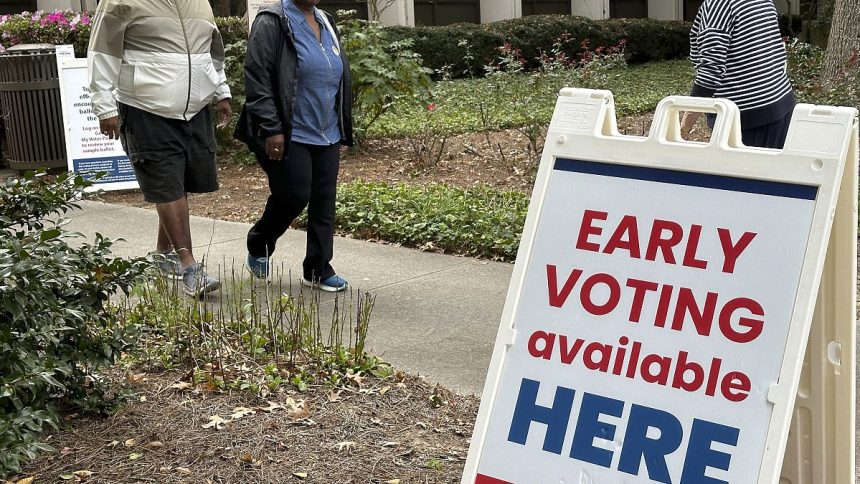The US state of Georgia reported a record turnout on the first day of early voting for the US presidential election on Tuesday.
Georgia is a key battleground state in the race between Vice President Kamala Harris and former President Donald Trump.
More than 300,000 people cast their ballots, according to election officials, over double the 136,000 who participated in the first day of early voting in the 2020 election between Donald Trump and Joe Biden. Gabriel Sterling, the chief operating officer for the Office of the Georgia Secretary of State, praised the “spectacular” turnout on X.
Both Harris’s and Trump’s campaigns have set their sights on winning Georgia. Trump held a rally on Tuesday in the state’s capital, Atlanta, and Harris will also hold an event in the city on Saturday.
In 2020, President Joe Biden became the first Democrat to win the state since 1992, a victory largely attributed to an uptick in Black voting. Black residents make up about one-third of Georgia’s population.
New ballot counting rule blocked by judge
Questions about the validity of Georgia’s election proceedings continue to hang over the state’s vote.
A judge blocked a new rule on Tuesday that requires Georgia Election Day ballots to be counted by hand after the close of voting. The ruling came a day after the same judge ruled that county election officials must certify election results by the deadline set in law.
The State Election Board last month passed the rule requiring that three poll workers each count the paper ballots — not votes — by hand after the polls close. The county election board in Cobb County, in Atlanta’s suburbs, had filed a lawsuit seeking to have a judge declare that rule and five others recently passed by the state board invalid, saying they exceed the state board’s authority, weren’t adopted in compliance with the law and are unreasonable.
In a ruling late Tuesday, Fulton County Superior Court Judge Robert McBurney wrote, that the so-called hand count rule “is too much, too late” and blocked its enforcement while he considers the merits of the case.
McBurney on Monday had ruled in a separate case that “no election superintendent (or member of a board of elections and registration) may refuse to certify or abstain from certifying election results under any circumstance.” While they are entitled to inspect the conduct of an election and to review related documents, he wrote, “any delay in receiving such information is not a basis for refusing to certify the election results or abstaining from doing so.”
Georgia law says county election superintendents — generally multimember boards — “shall” certify election results by 5pm on the Monday after an election, or the Tuesday if Monday is a holiday as it is this year.
The two rulings are victories for Democrats, liberal voting rights groups and some legal experts who have raised concerns that Donald Trump’s allies could refuse to certify the results if the former president loses to Democratic Vice President Kamala Harris in next month’s presidential election.
They have also argued that new rules enacted by the Trump-endorsed majority on the State Election Board could be used to stop or delay certification and to undermine public confidence in the results.










